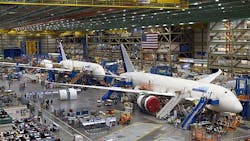The United States launched a WTO challenge to China's aircraft taxation on Tuesday, accusing Beijing of discriminating against foreign-made airplanes in breach of global trade rules.
President Barack Obama's administration said Beijing's exemption of certain airplanes in its nascent domestic aircraft industry from a 17% value-added tax was unfair to foreign aircraft suppliers.
In a request for consultations with China at the World Trade Organization on the issues -- the first step in a dispute settlement process -- the U.S. Trade Representative said the tax breaks for domestic makers of aircraft under 25 tons "result in substantial discrimination" against imports.
The challenge comes as China is seeking to develop its own aviation sector to reduce dependence on and develop rival suppliers to foreign giants such as Boeing and European rival Airbus.
"China's discriminatory, unfair tax policy is harmful to American workers and American businesses of all sizes in the critical aviation industry, from parts suppliers to manufacturers of small and medium-sized aircraft," said U.S. Trade Representative Michael Froman.
"We're also especially concerned that China attempted to hide this discriminatory tax policy. Transparency of laws and regulations impacting trade is a core WTO commitment that China must uphold, just as it expects other countries to do," he said.
"For these reasons, the United States is filing a trade enforcement case to hold China accountable."
According to the USTR, the U.S. has uncovered "evidence of multiple Chinese measures" that discriminate in favor of certain domestically made aircraft by exempting them from the 17% value-added tax (VAT) that is applied to imported aircraft under 25 metric tons by weight.
The tax is also applied to some U.S. aircraft parts while Chinese producers do not have to pay it, according to the USTR. In addition, China has not published its tax exemptions for domestically produced aircraft.
Learn More About the IndustryWeek Daily News Update
The USTR said these are two breaches of WTO rules: one prohibiting discriminatory taxation on the basis of national origin and the other transparency commitments.
The USTR said that the Chinese-made aircraft supported by the exemptions appear to include general aviation aircraft, including business jets, certain agricultural aircraft, and regional jets such as the ARJ21, made by the state-owned giant Commercial Aircraft Corp. of China.
It did not say which U.S. aircraft makers have been hurt by the policy. Boeing, the U.S. aerospace giant, generally makes aircraft larger than 25 tons.
U.S. producers of small and medium aircraft and aircraft components and systems are "all potentially disadvantaged," a U.S. trade official, speaking on condition of anonymity, said. For example, the official said, Canadian manufacturer Bombardier reports suppliers in 49 states.
China is one of the fastest-growing aviation markets in the world. The USTR cited estimates by Chinese regulatory agencies of annual growth of about 19% per year in general aviation aircraft through 2020.
Aerospace Key US Export
The U.S. aerospace sector employs nearly 500,000 people and is a major driver of U.S. economic growth and exports, and Washington has long been quick to defend it against alleged unfair treatment.
"The Obama administration is committed to strong trade enforcement to ensure that our trading partners play by the rules," Froman said.
If the consultations with China fail to reach an agreement, the U.S. may take the further step of requesting a WTO dispute settlement panel to weigh the matter.
Trade is a chronic irritant between the countries as China's massive economy depends largely on exports for growth, and the United States is its biggest import market. Some U.S. officials and businesses have long complained about the huge U.S. trade deficit with China and accuse Beijing of keeping its yuan currency undervalued to gain an unfair trade advantage.
In 2014, the United States won two WTO decisions against China, one for imposing unfair extra duties on American cars and sport utility vehicles and the other for imposing duties and quotas on exports of rare earths and other materials used in manufacturing high-tech goods like mobile phones and wind turbines.
"The success of our global trading system depends on transparency and strong enforcement. Each partnering country must play by the same rules," said Dave Reichert, chairman of a trade committee in the U.S. House of Representatives.
"Today's case is an important confirmation that enforcement matters," said Reichert, a Republican lawmaker who represents Washington state, where Boeing aircraft manufacturing is concentrated.
Veronica Smith, AFP
Copyright Agence France-Presse, 2015
About the Author
Agence France-Presse
Copyright Agence France-Presse, 2002-2025. AFP text, photos, graphics and logos shall not be reproduced, published, broadcast, rewritten for broadcast or publication or redistributed directly or indirectly in any medium. AFP shall not be held liable for any delays, inaccuracies, errors or omissions in any AFP content, or for any actions taken in consequence.
